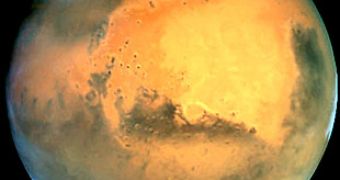Meteor showers occur on Earth every year. Some individual meteors streaming through the Martian atmosphere have been observed as well, however this is the first time when a full meteor shower is detected. By tracking the paths of the comets passing through the vicinity of Mars, UK scientists believe that they can predict meteor showers on Mars the same way meteor showers are predicted back here on Earth.
"Just as we can predict meteor outbursts at Earth, such as the Leonids, we can also predict when meteor showers are going to occur at Mars and Venus," says UK's Armagh Observatory astronomer Apostolos Chritou, the researcher to predict the Martian meteor shower. The study carried out by Chritou is related to the meteor shower determined by the passing of the comet 79/du Toit-Hartley through the vicinity of Mars, and will be detailed today at the Royal Astronomical Society's National Astronomy Meeting.
Chritou claims that by analyzing the brightness and length of the meteor stack both in optical and radio data, he can accurately determine the age, the size and composition of the coma from which it originated. According to estimations, the orbit of Mars actually intersects four times more comet dust material than the Earth, because most of the comets in our solar system are of short period and lie generally in the vicinity of Jupiter.
This means that in fact more meteor showers take place on Mars than on Earth. Additionally, this could also explain the mysterious change in the course of Mariner 4 spacecraft, during NASA's first mission to the Red Planet.
"We believe that shooting stars should appear at Venus and Mars with a similar brightness to those we see at Earth. However, as we are not in position to watch them in the Martian sky directly, we have to sift through satellite data to look for evidence of particles burning up in the upper atmosphere," said Christou.
With the help of the MGS satellite, Christou and his research team was able to predict six previous meteor showers caused by the interaction of dust trails left behind by the 79P/du Toit-Hartley comet with the Martian atmosphere. By measuring the electrical disturbances in Mars' atmosphere with MGS's radio communication system, the team pinpointed precisely the meteor streaks.
Out of the six meteor showers predicted by Christou, only two have been recorded by the MGS satellite, and only in one Christou found evidence of meteor showers. "We don't see anything in the 2005 data because the meteors burned up deeper in the atmosphere. It we are going to get a clear picture of what is going on, we need more optical and ionospheric observations of meteor showers at both the Earth and Mars so we can establish a definitive link between cause and effect," said Christou.

 14 DAY TRIAL //
14 DAY TRIAL //